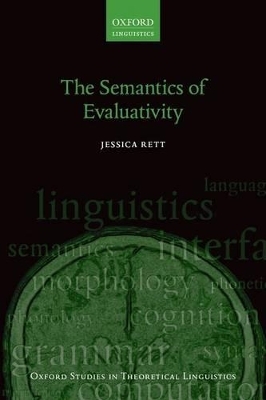
The Semantics of Evaluativity
Seiten
2014
Oxford University Press (Verlag)
978-0-19-960248-3 (ISBN)
Oxford University Press (Verlag)
978-0-19-960248-3 (ISBN)
This book focuses on the semantic phenomenon of evaluativity in sentences such as John is tall and its consequences across constructions. It proposes an account based on assumptions that speakers and hearers make about the relationship between the simplicity of a situation and the simplicity of the language used to describe that situation
This book focuses on the semantic phenomenon of evaluativity and its consequences across constructions. Evaluativity has traditionally been associated exclusively with the positive construction, a term for sentences with a gradable adjective but with no overt degree morphology. John is tall is evaluative because it entails that John is tall relative to a contextually valued standard. John is taller than Sue and John is as tall as Sue are not evaluative because both could be used even if John and Sue were short.
Previous accounts of evaluativity have assumed that it is not part of the inherent meaning of adjectives, but is contributed by a null morpheme. Jessica Rett argues against this analysis, proposing that no null morpheme is required. Instead, evaluativity is explained on the basis of assumptions that speakers and hearers make about the relationship between the simplicity of a situation and the simplicity of the language used to describe that situation; the analysis is couched in recent approaches to Gricean conversational implicature.
This book focuses on the semantic phenomenon of evaluativity and its consequences across constructions. Evaluativity has traditionally been associated exclusively with the positive construction, a term for sentences with a gradable adjective but with no overt degree morphology. John is tall is evaluative because it entails that John is tall relative to a contextually valued standard. John is taller than Sue and John is as tall as Sue are not evaluative because both could be used even if John and Sue were short.
Previous accounts of evaluativity have assumed that it is not part of the inherent meaning of adjectives, but is contributed by a null morpheme. Jessica Rett argues against this analysis, proposing that no null morpheme is required. Instead, evaluativity is explained on the basis of assumptions that speakers and hearers make about the relationship between the simplicity of a situation and the simplicity of the language used to describe that situation; the analysis is couched in recent approaches to Gricean conversational implicature.
Jessica Rett studied linguistics at the University of Michigan and Rutgers, the State University of New Jersey. She now teaches theoretical semantics at the University of California, Los Angeles. Her primary research interests are degree semantics and the semantics/pragmatics interface, the study of how the meaning of words and language affects the use of language, and vice versa.
1. Introduction ; 2. The null morpheme POS ; 3. The null morpheme EVAL ; 4. Implicature: a brief review ; 5. Evaluativity as implicature ; 6. Extensions of the evaluativity implicature ; 7. Conclusion
| Erscheint lt. Verlag | 18.12.2014 |
|---|---|
| Reihe/Serie | Oxford Studies in Theoretical Linguistics |
| Verlagsort | Oxford |
| Sprache | englisch |
| Maße | 157 x 234 mm |
| Gewicht | 344 g |
| Themenwelt | Geisteswissenschaften ► Philosophie ► Sprachphilosophie |
| Geisteswissenschaften ► Sprach- / Literaturwissenschaft ► Sprachwissenschaft | |
| ISBN-10 | 0-19-960248-4 / 0199602484 |
| ISBN-13 | 978-0-19-960248-3 / 9780199602483 |
| Zustand | Neuware |
| Haben Sie eine Frage zum Produkt? |
Mehr entdecken
aus dem Bereich
aus dem Bereich
Aspekte einer Ontologie des Logos
Buch | Hardcover (2024)
Springer Fachmedien (Verlag)
CHF 167,95
Wie die Menschheit zu ihrer größten Erfindung kam
Buch | Softcover (2022)
C.H.Beck (Verlag)
CHF 25,20
Macht und Legitimität politischer Sprache im Prozess der europäischen …
Buch | Softcover (2023)
Nomos (Verlag)
CHF 103,60


